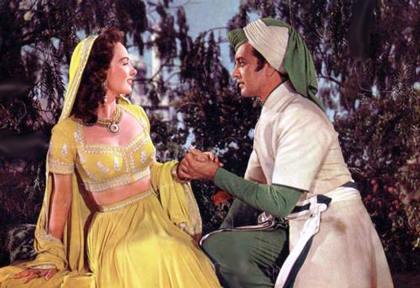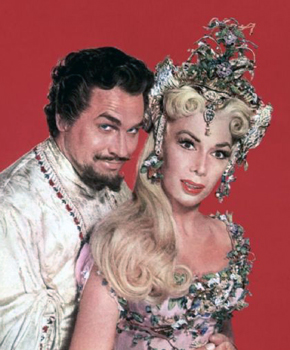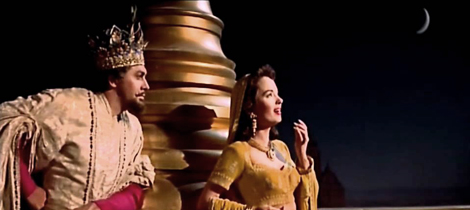|
|
Reviewed by Glenn Erickson
By the middle 1950s the grand MGM factory had been reduced to a shadow of its former self, yet producer Arthur Freed and director Vincente Minnelli were able to maintain the MGM musical tradition for a few more years. Made the same year as Freed, Donen and Kelly's superior original It's Always Fair Weather, the Freed-Minnelli adaptation of the musical Kismet is a big, colorful and melodic farce adapted directly from a successful stage musical. It is several showbiz mutations down the line from an original 1911 play written by Edward Knobock and produced by Oscar Asche, who would soon enjoy a monster hit with another Orientalism- flavored play, Chu Chin Chow. After two earlier film adaptations (1920, 1930) starring Otis Skinner, MGM made a 1944 Technicolor version of the play with the dream cast of Ronald Colman and Marlene Dietrich. Transforming Kismet into a stage musical was the idea of Edwin Lester, the director of the Los Angeles Civic Light Opera. He had already produced Song of Norway to popularize the music of Edvard Grieg, and for Kismet tapped the Russian composer Alexander Borodin. Famous screenwriter Charles Lederer was one of the authors of the play, which soon moved from California to Broadway.
The film version was shot almost completely on sound stages at MGM, in CinemaScope and Eastmancolor, and became a Christmas release for 1955. Despite some weak casting the bright and cheerful show plays well, occasionally reaching heights of Orientalist reverie through Borodin's music.

"The Poet" (who soon borrows the name Hajj) (Howard Keel) and his optimistic daughter Marsineh (Ann Blyth) enter the Baghdad market to beg or steal something to eat. Having the gift of fast talk, Hajj manages to beg several coins, initiating a dizzying series of reversals of fortune that can only be explained as 'Kismet', or fate. Repeatedly arrested and just as rapidly set free, Hajj uses his tongue to saves his neck from the wrath of both the bandit Jawan (Jay C. Flippen) and the Police Chieftain the Wazir (Sebastian Cabot). Pretending to be a wizard capable of setting and lifting magic curses, he elevates his risk factor with every lie he tells. When a total accident convinces the Wazir that Hajj's magic is real, The Poet sees the opportunity to become an Emir with riches of his own -- and access to the Wazir's seductive, unfulfilled wife Lalume (Dolores Gray). Meanwhile, Marsineh has fallen in love with a mysterious fellow who is likewise love-struck by his first sight of her. He calls himself a gardener but he's really the all-powerful Caliph (Vic Damone), venturing incognito among his people. For Hajj this one amazing day continually alternates between promises of horrible punishments and grand rewards, while Marsineh finds true love, and almost loses it.
We know we're watching a romantic "Oriental" fantasy when 1) the hero is a dreamer who smiles as he tells flowery stories of mortal aspirations, and 2) someone brings up the existence of a distant oasis far from strife and bother, where lovers might enjoy all the time in the world for romance. Hajj plunks himself down to beg in the marketplace 1 and in just a few minutes establishes a reputation and amasses a hefty stack of coins. Howard Keel is neither a Douglas Fairbanks nor even a Ronald Colman, an actor who had the ability to make any dialogue sound like poetry. But he does have enthusiasm and a playful eye.
Having appeared the previous year in The Student Prince and Rose Marie, Ann Blyth was surely a witness to the chloroforming of MGM's ongoing musical factory. This is the best of her three appearances, and her song "Baubles, Bangles and Beads"" is the film's standout production number. MGM's top orchestrators Alexander Courage, Arthur Morton and Conrad Salinger do a remarkable job with the audio on this number, which sounds especially pure and bright.

Dolores Gray is yet another talent cheated by the demise of the great MGM musical. With her overpowering show-biz smile and strong singing voice, Gray puts the Baghdad civic-booster song "Not Since Nineveh" over in fine form and holds together Lalume's harem song "Rahadlakum". That odd word is sung as if it refers to some sort of erotic delight, but suspiciously (from the censor clean-up angle) turns out to be an intoxicating culinary delicacy. Lalume is a major exception in Hollywood court-intrigue fantasies in that she's an oversexed adulteress yet a completely sympathetic character. She's rewarded with a (presumed) farewell ride to that magical oasis of love, something that the Production Code normally wouldn't like.
On the other hand, in the play Hajj commits a premeditated murder. He does it in full view of the Caliph, yet all it takes to clear himself of the charge is a glib explanation, which in this case happens to be the truth. No way would the Code allow that to reach the screen.
Vic Damone had been in several MGM musicals previously. He's got a good singing voice but contributes little else. New York Times reviewer Bosley Crowther unkindly opined that "Mr. Damone would make a fine cigar-store Indian as the young caliph". Even in the garden scene singing "Strangers in Paradise", Ann Blyth must carry the emotional burden. Probably the most successful transformation of a classical music selection into a pop tune, Stranger in Paradise was adapted from 'Gilding Dance of the Maidens' from Polovtsian Dances, in Borodin's opera Prince Igor. It's a singularly emotional piece of music that achieves a spiritual dimension; when it premiered in 1890 the concert hall must have felt like heaven itself. 2
Kismet has a lot going for it, yet it still misses the first rank of MGM musicals. The book part of the play is amusing but never particularly witty, and although he's more than likeable as a rogue and a ham, Howard Keel doesn't quite put over the 'poet' part of Hajj. Minnelli's direction animates Keel, Blyth and Gray but hardly anyone else really impresses. The supporting cast includes veterans Sebastian Cabot and Monty Woolley, but it appears that Woolley's role as the Caliph's advisor has been greatly cut down. Only the wild-eyed Jay C. Flippen gets a chance to cut loose with his character -- I'm not sure I've ever seen him this animated. Among the various guards and beggars are Mike Mazurki, Jack Elam, Ted de Corsia, Ross Bagdasarian, Jamie Farr, Bernie Hamilton, Aaron Spelling and Bruno VeSota. I can see de Corsia and VeSota talking between takes: "I'm going to make this weird crime picture for this young guy from Brooklyn." "That's nothing, I made a movie so weird, nobody will release it."

Kismet '55 does suffer from a lack of visual dynamism, and I think Minnelli's use of CinemaScope is partly at fault. The sets and costumes are nicely designed, but Minnelli and Joseph Ruttenberg appear to use only one or two focal lengths of C'Scope lenses throughout. Close-ups are avoided but also any angle requiring a sharp depth of field. This was the philosophy behind the first CinemaScope pictures two years before, which were concerned that fast cutting or lively angles on the big, wide screen would confuse or irritate audiences. As a result much of the movie looks shallow and flat, with the camera staying far too wide on many scenes. For example, the Stranger in Paradise duet remains in medium wide shot, diluting the moment with a lot of irrelevant peripheral greenery. An intimate scene between Hajj and Marsineh is a medium shot that also frames the painted moon on MGM's impressive cycloramic backdrop (image just above). In the Wazir's harem the girls are mostly photographed from a minimum of twenty feet away. One of them is said to be the celebrated Barrie Chase, but putting careful makeup on them was a waste of effort.
The musical was noted for its Jack Cole choreography, which is best enjoyed in the Not Since Ninevah number as a dance by the three Asian princesses (Reiko Sato, Patricia Dunn & Wonci Lui). But it's also covered in wide shots, with little or no cutting. If there is anything of Vincente Minnelli's celebrated visual style in Kismet, I can't say that I see it. Perhaps his mind was already on the French locations for his next movie for MGM, Lust for Life.
The Warner Archive Collection Blu-ray of Kismet is a stunning HD transfer with excellent stereo audio. Cameraman Ruttenberg's conservative use of CinemaScope has resulted in sharp and mostly distortion-free images, and eye-popping color for a non-Technicolor release. Either full sound elements have been found, or the studio engineers in 1955 really worked to enhance the dynamic stereo effects in the track, for the directional audio is really good on the musical numbers.

Warners have included an attractive stack of extras. A different beginning to Rahadlakum is here in B&W -- it might have added a little spice to the number. The audio take of a deleted song called "Rhymes Have I" is presented as well. The Kismet trailer stresses sex and hanky-panky at all times, even though the Code keeps everything in the film on such a hands-off basis. The 1944 Kismet trailer has been included as well. As we can see, it could use some of that inspirational Borodin music, but Ronald Colman and Marlene Dietrich make a far more exotic couple.
Two excerpts from the MGM Parade TV show reveal George Murphy and Howard Keel talking up the picture, with clips. We also get two 1955 short subjects The Battle of Gettysburg and Tex Avery's animated The First Bad Man (standard def.).
It's a great thing that the WAC now releases Blu-rays as well as DVDs of selected titles. The price should certainly get the attention of collectors, who are now finding that many desirable vintage titles are sold only in limited editions. And whenever I see a choice musical arrive on disc I detect the guidance of a certain respected WB home video executive. Seeing Dolores Gray's dazzling "Klenzrite" smile here in HD, I'm hoping that the Archive will release a Blu-ray of the wonderful It's Always Fair Weather.
On a scale of Excellent, Good, Fair, and Poor,
Kismet Blu-ray rates:
Movie: Good +
Video: Excellent
Sound: Excellent DTS HD Master Audio 5.1
Supplements: Short subjects, TV promo exerpts, alternate scene excerpt, deleted song audio, 2 trailers.
Deaf and Hearing Impaired Friendly?
YES; Subtitles: English
Packaging: Keep case
Reviewed: June 11, 2014
Footnotes:
1. ... ah, but is he "deaf so far as the song of the mockingbird is concerned?"
Return
2. from my limited experience, I relate the Polovtsian Dances song with other attempts to create ethereal, transcendent musical themes in film. Just two examples are Dimitri Tiomkin in Lost Horizon and James Bernard in She. Mysterious lost worlds seem to need this kind of emotional release.
Come to think of it, Borodin's fellow Russian Tiomkin places wondrous, ethereal pieces of music into murder mysteries, westerns, even war movies. I wish I were more capable of describing these musical effects, although feeling them is more than enough.
Return

Text © Copyright 2014 Glenn Erickson
See more exclusive reviews on the Savant Main Page.
Reviews on the Savant main site have additional credits information and are often updated and annotated with reader input and graphics.
T'was Ever Thus.
Return to Top of Page
|

